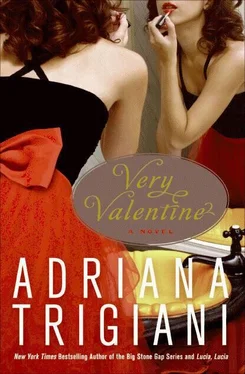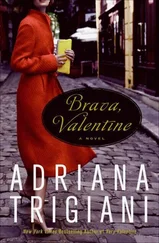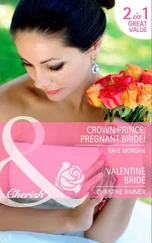“My name is Megan Donovan.”
“You’re Irish,” June says without even looking up. “I’m a lass myself. We’re outnumbered here. You can stay.”
“What do you need?” Gram asks her.
“I’m a PA on the movie shooting over at Our Lady of Pompeii Church…” Her voice goes up at the end of the sentence, like a question, but she’s not asking one.
“That’s my parish.” Gram sounds surprised that they’d be making a movie where she attends mass, got married, and baptized my mother.
“They didn’t check with you first?” June continues to pin fabric, but this time she looks up. “Call the Vatican,” June says with a grin.
“What’s the movie about?” I ask Megan.
“Well, it’s called Lucia, Lucia . And it’s about a woman in 1950 in Greenwich Village. Anyhow, we’re filming the scene of her wedding and her heel broke. And I Googled wedding shoes in Greenwich Village and found you guys. I thought maybe you could fix it.”
“Where’s the shoe?”
Megan drops the wet backpack off her shoulders, unzips it, and lifts out a shoe, which she hands to Gram.
I join Gram behind the table to assess the damage. The heel has completely ripped away from the shaft.
“It can’t be fixed,” I tell her. “But this is a size seven. Our samples are sevens.”
“Okay, let me tell them.” Megan whips out a BlackBerry and types rapidly with both thumbs across the keypad. She waits for a response. She reads. “They’re on their way.”
“Who?” Gram asks.
“My bosses. The costume designer and the producer.”
“We can’t fix this shoe,” Gram says firmly.
Megan looks flustered. “This is my first movie and these people are real perfectionists. When the heel broke, they all started screaming. They gave it to me and said, ‘Get it fixed,’ like they’d kill me if I didn’t. They’re serious about every freakin’ thing. I mean, totally picky. The bride couldn’t just carry white roses; it had to be a certain kind of white roses. I was at the flower market this morning at three AM to get some Ecuadorian rose that blooms, like, once a year.” Megan wipes her eyes with her sleeve; I don’t know if she’s wiping away tears of frustration or rain.
Gram pours Megan a cup of coffee. Megan dumps cream and sugar into the mug until the coffee is the color of sand. She grips the mug with both hands and sips.
“Well, now we know where the craftsmanship in America has gone. It’s in the movies.” Gram smiles.
“Here, give me your sweatshirt. I’ll throw it in the dryer,” I tell Megan. She peels it off and hands it to me. Her black T-shirt with bold white letters that say ADDICTED is, amazingly, dry.
“This place is really old.” Megan looks around and drinks in the operation.
“Yes it is.” Gram nods. “How do you like making movies?”
“I’m so low on the ladder, you don’t need a step to reach me.” Megan sighs.
There is another loud knock at the door. “That’s them!” Megan panics, puts her coffee down, and goes to the door.
Megan returns followed by two women who talk rapidly to each other and at the same time seem preoccupied. “This is Debra McGuire, our costume designer.” Megan almost curtsies.
Debra’s long, dark brown hair is worn in a loose braid to her waist. She wears bright red lipstick, and has half-moon-shaped brown eyes that squint around the room as she takes in our operation. She peels off her black patent trench coat. Underneath, she wears turquoise sari pants tucked into yellow patent leather wellies, a short pink silk skating skirt over the pants. On top, she wears a yellow-and-white-pin-striped band jacket that looks like she stole it off the body of Sergeant Pepper. It’s hard to say how old she is. She could be in her thirties, but she has the presence and command of a woman of fifty. “Have you fixed the shoe?” she snaps at Megan.
“No,” Gram interjects. “And who are you?” Gram turns to the woman standing beside Debra.
“I’m Julie Durk, the producer.”
Julie is in her thirties, with pale skin and blue eyes. Unlike the demanding Debra, she dresses like me, in faded denim jeans and a black turtleneck and black suede boots. Julie also wears a navy blue baseball jacket that says LUCIA, LUCIA in red where the team logo would go.
“Where are we?” Debra looks around the shop and then at Megan, more annoyed than curious. Before Megan can speak, Gram interrupts.
“The Angelini Shoe Company,” Gram tells her. “We make custom wedding shoes.”
“I’ve never heard of you.” Debra circles around the cutting table to get a view of the pattern June is working on. “Do you know Barbara Schaum?”
“The sandal maker in the East Village? She’s wonderful,” Gram says. “She’s been around since the early sixties.”
“This shop has been here since 1903,” I say, hoping this woman will get the hint to be respectful to my grandmother.
“Not many of you left.” Debra moves over to study the shoe I’ve been working on. “You guys do what again?”
“We make wedding shoes.” Now I’m peeved.
“Ms. McGuire has a lot on her mind,” Megan apologizes for her boss.
“Please.” Debra waves her hand at Megan dismissively. “Now why can’t you fix my shoe?”
“It’s beyond repair,” I tell her.
“We have to do reshoots, then,” Julie says, biting her lip.
“It’s a fashion film,” Debra snaps. “We have to get it right.”
“Who made this shoe?” Gram holds up the broken model.
“Fougeray. He’s French.”
“If you talk to him, tell him it’s better to use titanium in the heel.”
“He’s dead, but I’ll tell his rep,” Debra says sarcastically.
“Young lady, I’m busy. I don’t need your attitude,” Gram continues, unfazed. “The shoemaker glued the shaft.” She lifts up the heel. “That’s inferior workmanship.”
“They were very expensive.” Julie sounds apologetic, but I’m not sure if it’s directed to Gram or to Debra.
“I’m sure they were. But they’re poorly made, no matter how much they cost.” Gram raises her eyebrows. “So how much of the shoe do you see in the scene?”
“The shoe is the scene. There’s a close-up, a tracking shot-” Debra puts her hands on the cutting table and bows her head to think.
“Maybe-,” Julie begins.
Debra stops her. “If they can’t repair it, they can’t repair it. We’ll have to reshoot with a different shoe.”
“Would you like to see our collection?” Gram asks. Debra doesn’t answer. “We’re not French, but we’re experts.”
“Okay, okay, let’s see what you have.” Debra sits down on a work stool and rolls to the table. “You dragged me over here.” She looks at Megan. She folds her hands on the pattern paper. “So dazzle me.” She looks at us.
“This place is a wonderland of possibilities,” Megan says, looking at Gram and me with hope.
“It’s a custom shoe shop,” Gram corrects her. “Valentine, bring out the samples, please.”
“What are you looking for, exactly?” June asks Debra.
“It’s a Cinderella moment.” Debra stands and dramatizes the scene. “The bride runs out of the church and her shoe falls off.”
“Bad luck,” Gram says.
“How do you know?” Debra says.
“It’s an old Italian wives’ tale. Is the movie about an Italian?”
“Yes. A grocer’s daughter in the Village.”
“Megan said it takes place in 1950.” Gram looks at Megan, who smiles gratefully for including her in the professional conversation. “One of our styles was designed in 1950 by my husband.”
“I’d love to see it,” Debra says, smiling with feigned enthusiasm.
I line up on the worktable the boxes from the sample closet. Gram takes a soft flannel cloth and wipes down the outside of the boxes before opening them. This is a habit, since we work with pale shades of fabric that can stain and scuff on touch.
Читать дальше












